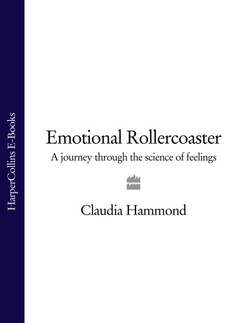Читать книгу Emotional Rollercoaster: A Journey Through the Science of Feelings - Claudia Hammond - Страница 16
Two Sadness
ОглавлениеAirports are not supposed to be sad places. People are off on ‘the holiday of a lifetime’, ‘a dream honeymoon’ or a gap year ‘finding themselves’. Wherever I’m heading I find myself looking up at the departure screens, imagining which flight I’d board if I could choose: will it be Kuala Lumpur or Moscow, Lima or Nairobi? But this is just my experience. Airports aren’t always happy places.
A woman walks slowly towards the automatic glass doors carrying a soft black bag on her shoulder and a linen jacket wedged in the crook of her elbow. She looks back, slightly embarrassed, aware that others are watching. Lifting her arm, she waves hesitantly at her family who stand with their mouths turned down. Their eyes are already wet. She shows her boarding pass to the man at the desk and walks through the doors ready to snake her way to the x-ray machines. Her family wait for the final glimpse, then put their arms around each other in comfort. For a while they stand still. How long should they wait? They turn and head slowly for the car park, not noticing a young man watching grimly as his pretty girlfriend passes through the same doorway. Will she still be his after a year’s backpacking? A party of ten or twelve are seeing off an elderly Indian woman carrying two vast, checked shopping bags. The toddler is busy running straight into the stretchy barrier and bouncing back off it, but everyone else in the group is crying. Will this be the last time they see her? The stories of all these visitors to the departure lounge are very different, but they’re all sharing the same emotion – sadness.
When someone else read this description they said that imagining those people made them feel sad, but in fact I’d made these stories up. Nevertheless my friend was experiencing that strangely enjoyable sadness you get if you watch a sentimental film. The next time I was at an airport, instead of pondering where to go, I looked around for the sadness and there was plenty. This time it was genuine.
Real sadness, imagined sadness and a slightly luxurious, voyeuristic sadness – this is an emotion which can work at different levels. A little sadness can be quite pleasurable. If you look back at happy times, you might feel sad that a part of life is over, never to be retrieved, but at the same time it’s a warm, nostalgic sadness, free from despair. Melancholy music can have the same effect and we choose to listen to it specifically because it prompts an indulgently enjoyable sadness. In fact over the centuries sadness hasn’t always been seen as a negative emotion. In her work on diaries from seventeenth-century England the researcher Carol Barr-Zisowitz found pride in the feeling of sadness. It was even considered to be the opposite of sinfulness; if you were sad you were seen as patient and wise, despite your difficulties. She also notes that in some societies sadness can have the same effect today. In Iran and Sri Lanka for example a degree of melancholy is taken as an indication of a person’s depth.
Even in cultures where sadness is on the whole perceived to be negative, the absence of this feeling can be seen as problematic. A life spent feeling ceaselessly happy due to the drug soma was part of Aldous Huxley’s nightmare vision of the future in Brave New World. You could argue that if you never felt miserable then neither could you ever feel true happiness. However, we wouldn’t consider a life without illness to be a problem, despite a lack of contrast with good health. In fact when you feel ill the idea of feeling well again seems blissful, but after only a day or two of good health it’s easy to forget how good you feel. Just as it’s hard to appreciate every moment of well-being, it is hard to relish the absence of sadness.
In this chapter I’ll be exploring why a sad face expresses so much and what happens in the brain when we’re feeling sad, as well as the chemical secrets held within that strange symptom of sadness, crying. First it is necessary to understand the purpose of sadness and its close but more complex relation, depression.
